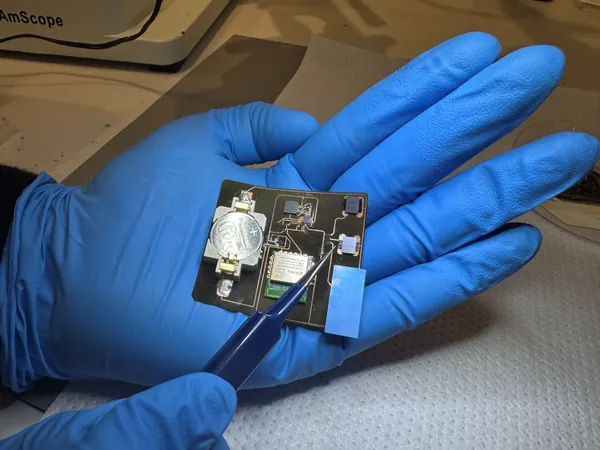
Revolutionary Wearable Wound Sensor Set to Transform Healing Monitoring
2025-08-01
Author: Nur
A Breakthrough in Wound Care Technology
Imagine a world where healing wounds can be monitored without the need for constant dressing changes. Thanks to innovative research from RMIT (Royal Melbourne Institute of Technology), this dream is becoming a reality with a cutting-edge wearable wound sensor that tracks healing remotely via Bluetooth!
Cost-Effective and Reusable Solution
Unlike traditional wound care methods that often involve costly disposable dressings, RMIT’s proof-of-concept device is designed for reuse, making it not only practical but also more economical. This is crucial as the NHS estimates wound care in the UK costs a staggering £8.3 billion annually, while in Australia, chronic wounds affect approximately 500,000 people, leading to a hefty $3 billion yearly toll on its healthcare system.
High-Tech Healing Indicators
Project leader Dr. Peter Francis Mathew Elango reveals that this advanced device incorporates sophisticated sensor technologies to continuously monitor vital healing indicators like inflammation, pH levels, and temperature. For instance, elevated temperatures can hint at infections, and varying pH levels may indicate the healing stage of a wound.
Real-Life Testing and Future Trials
To validate the technology, the team simulated real-life conditions by applying the device to a human arm. Elango stated, "This successful test showcases the feasibility of this alternative monitoring technology. We are now eager to collaborate with industry partners to push it into clinical trials.
An Affordable Future in Wound Monitoring
With potential manufacturing costs dropping below $5 per unit when mass-produced, this biocompatible technology promises to seamlessly integrate into existing manufacturing workflows. RMIT’s patented platform employs flexible sensors that can be placed directly on or adjacent to wounds.
Innovating Beyond Wound Care
Professor Madhu Bhaskaran, leading the project, highlighted the advancement of high-resistivity silicon-based sensor technology, noting its effectiveness in detecting multiple biomarkers. Bhaskaran's team at RMIT has also seen success with smart bedding sensors aimed at improving the sleep quality of the elderly. Their pioneering efforts in wearable technology, like heart monitors developed by Elango, are now steering toward commercialization in partnership with Lubdub Technologies in Perth.
The Future of Medical Monitoring Is Here!
As we stand on the brink of a technological revolution in healthcare, RMIT's wearable wound sensor could not only change how we manage wound healing but also pave the way for smarter, more connected healthcare solutions.




 Brasil (PT)
Brasil (PT)
 Canada (EN)
Canada (EN)
 Chile (ES)
Chile (ES)
 Česko (CS)
Česko (CS)
 대한민국 (KO)
대한민국 (KO)
 España (ES)
España (ES)
 France (FR)
France (FR)
 Hong Kong (EN)
Hong Kong (EN)
 Italia (IT)
Italia (IT)
 日本 (JA)
日本 (JA)
 Magyarország (HU)
Magyarország (HU)
 Norge (NO)
Norge (NO)
 Polska (PL)
Polska (PL)
 Schweiz (DE)
Schweiz (DE)
 Singapore (EN)
Singapore (EN)
 Sverige (SV)
Sverige (SV)
 Suomi (FI)
Suomi (FI)
 Türkiye (TR)
Türkiye (TR)
 الإمارات العربية المتحدة (AR)
الإمارات العربية المتحدة (AR)